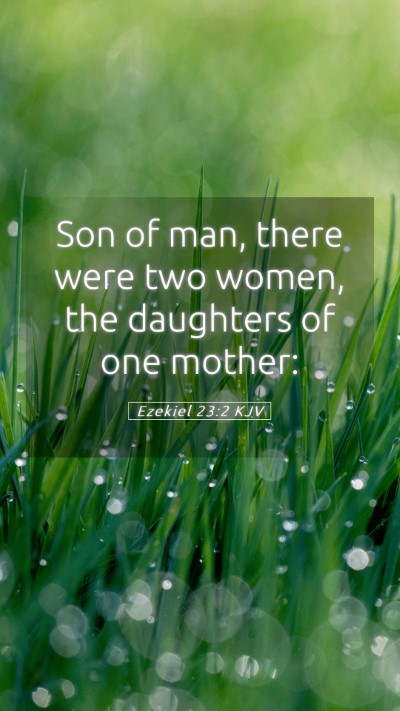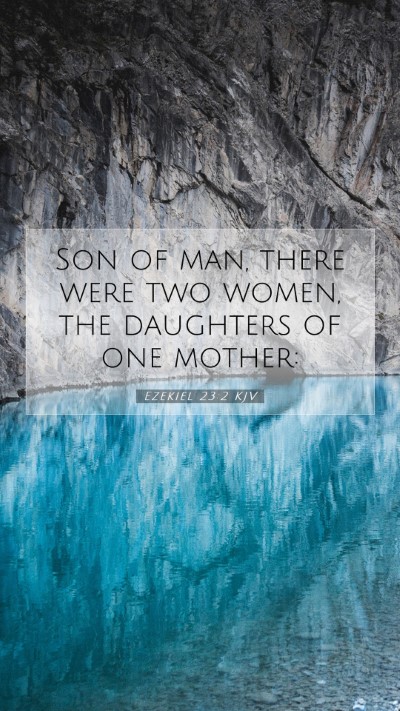Bible Verse Meaning: Ezekiel 23:2
Ezekiel 23:2 reads: "Son of man, there were two women, the daughters of one mother." This verse introduces a significant allegorical narrative that the prophet Ezekiel uses to convey God's message to Israel. In this commentary, we draw insights from various public domain commentaries such as those by Matthew Henry, Albert Barnes, and Adam Clarke, to explore the depth of its meaning.
Overview of Ezekiel 23
Ezekiel 23 is a vivid and powerful chapter that employs the metaphor of two sisters, Oholah and Oholibah, to represent the kingdoms of Israel and Judah. This allegory illustrates their infidelity to God and the consequences that followed. The use of feminine imagery highlights the unfaithfulness in a relatable and impactful manner.
Key Themes
- Symbolism of the Sisters
The two women symbolize two major divisions within the people of Israel, each representing the nature of their rebellion against God's commandments. Oholah stands for Samaria (the Northern Kingdom), while Oholibah depicts Jerusalem (the Southern Kingdom).
- Message of Judgment
The chapter speaks pointedly about the impending judgment as a result of their spiritual harlotry and idolatry. Ezekiel’s prophecy warns the people of the severe consequences of their actions.
- The Mother Figure
The mention of “one mother” signifies a common origin; thus, despite their differences, both kingdoms had a shared heritage and responsibility before God. This serves as a reminder of their collective duty to remain faithful.
Commentary Insights
Matthew Henry
Matthew Henry emphasizes the metaphorical representation of these nations and their betrayal as likened to an unfaithful wife. This metaphor illustrates how Israel and Judah turned to idols and foreign alliances instead of trusting in God alone.
Albert Barnes
Albert Barnes suggests that the choice of "two women" serves to highlight the multiplicity of sins committed by the Israelites. Their actions are cataloged like a list of infidelities, which enhances the severity of their transgressions. Barnes notes that this imagery invites the readers to grasp the depths of Israel’s unfaithfulness through familial ties.
Adam Clarke
Adam Clarke adds that the naming of one mother serves to remind the audience that they originated from one lineage, thus intensifying the impact of their betrayal. He highlights the divine intention of using this story—the effect is to awaken a sense of guilt and provoke repentance among the people.
Lessons and Applications
- Understanding Loyalty to God
This verse, along with the surrounding text, urges individuals to examine their faithfulness to God, casting a reflective light on contemporary spiritual fidelity.
- Caution Against Idolatry
The use of the metaphor of infidelity warns of the dangers of spiritual complacency and syncretism with worldly ideologies.
- Collective Responsibility
The narrative underscores that communities share common values and must hold each other accountable, as their actions reflect either fidelity or infidelity to God.
Cross References
- Hosea 1:2 - References Israel's unfaithfulness in metaphorical language.
- Isaiah 1:21 - Discusses the spiritual corruption of Jerusalem, paralleling themes found in Ezekiel.
- Jeremiah 3:6-10 - Relates to the notions of infidelity and the consequences faced by Israel.
Conclusion
The verse Ezekiel 23:2 stands as a compelling introduction to a parable of unfaithfulness and judgment that is deeply relevant to personal and communal spiritual life. As we reflect on this scripture, we gain valuable insights about our relationships with God, the importance of fidelity in faith, and the reassurance that despite our failings, there is always a call to repentance and restoration.
This analysis serves as a resource for those engaged in Bible study insights, Bible verse commentary, and understanding Scripture. By delving into these interpretations, we can better appreciate the theological implications and seek to apply the lessons found in Scripture to our lives.


